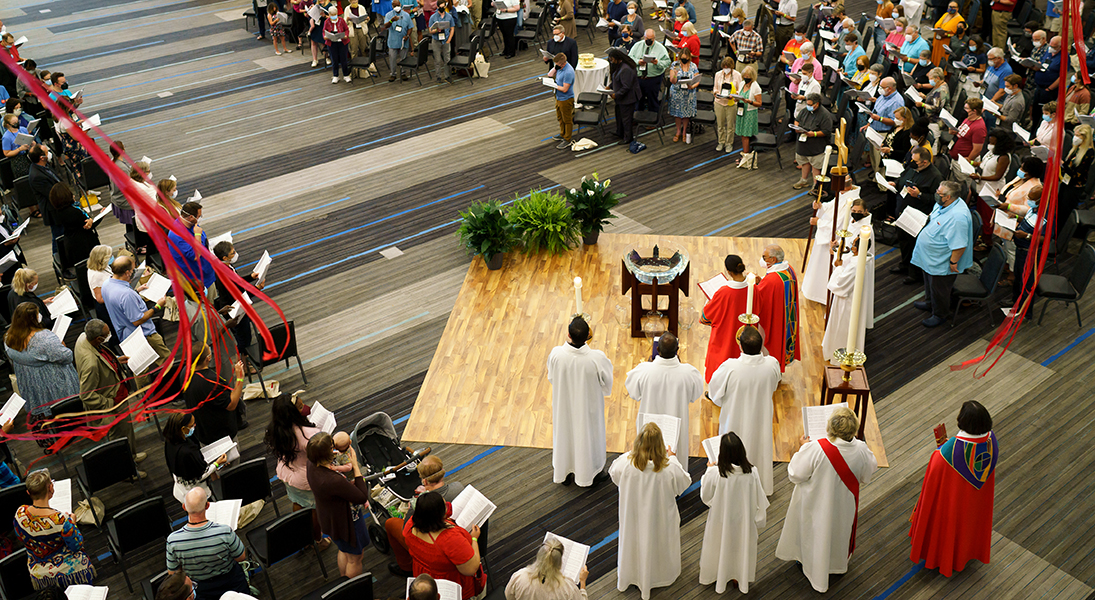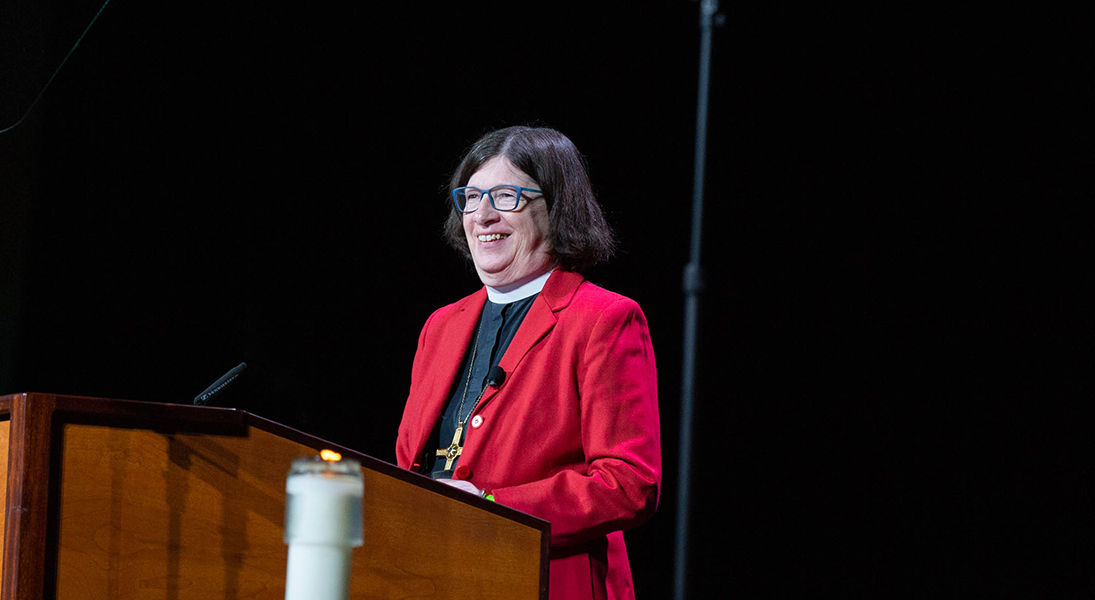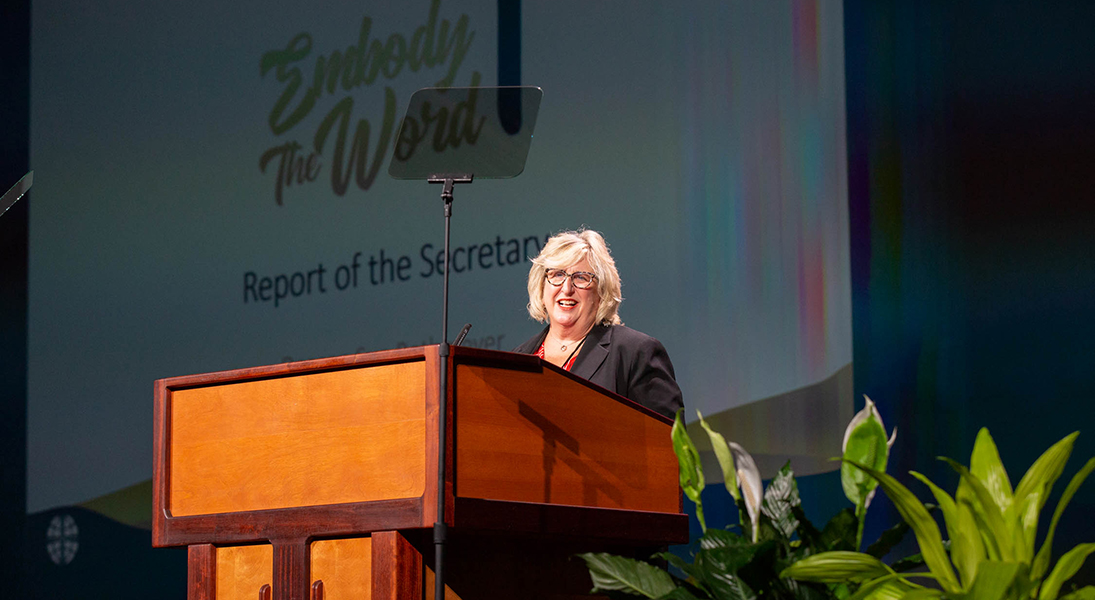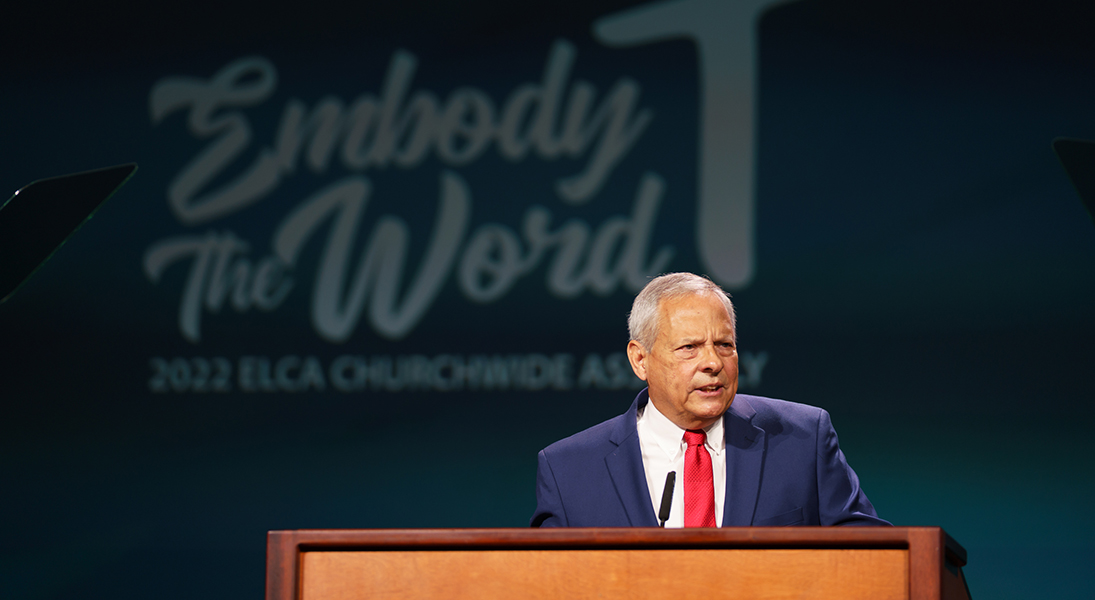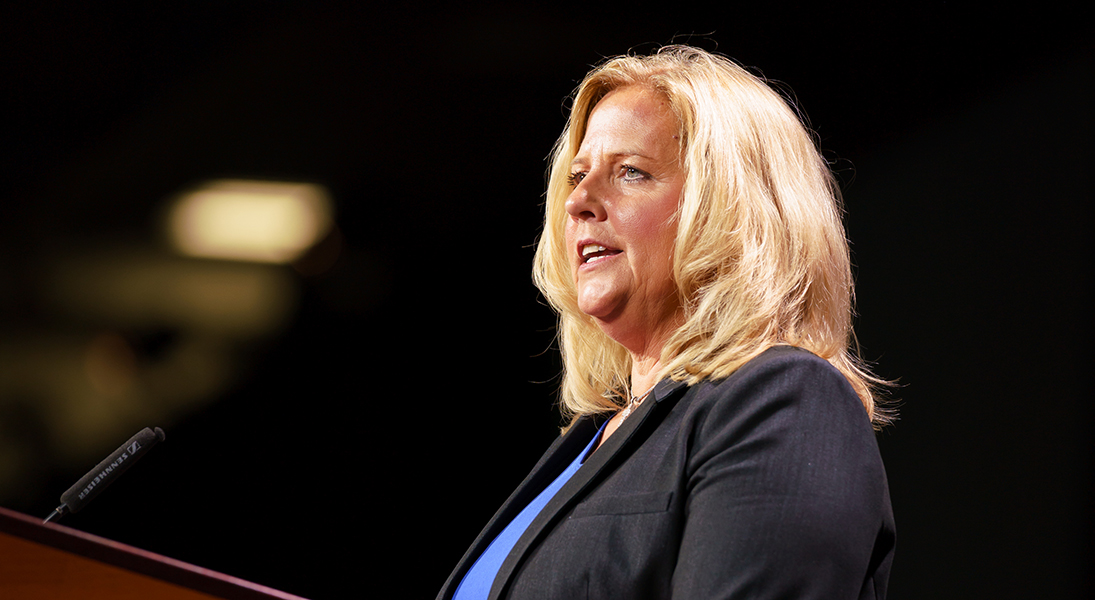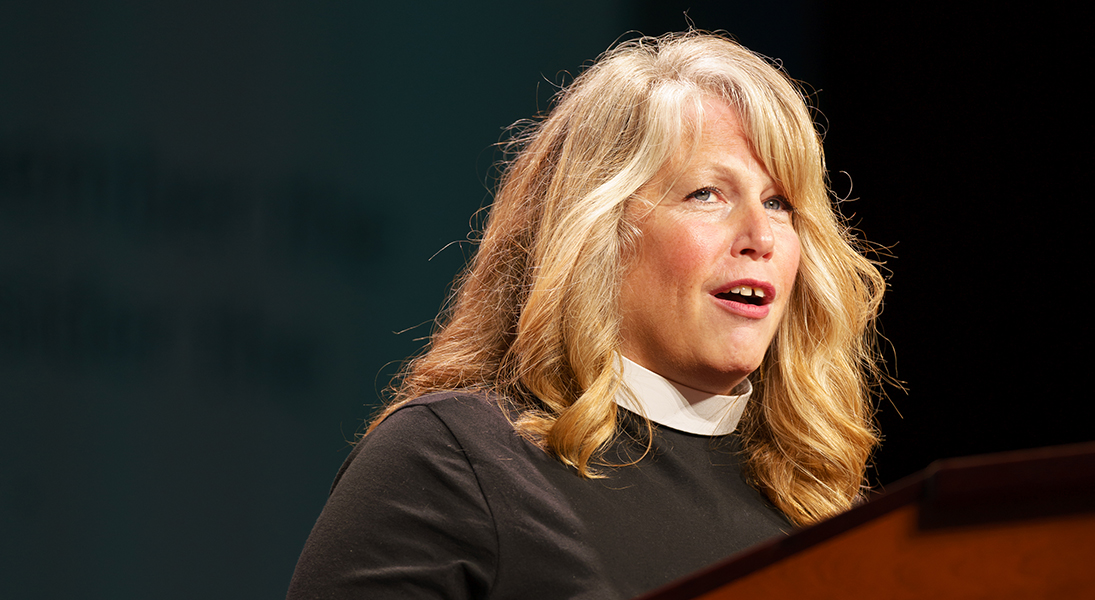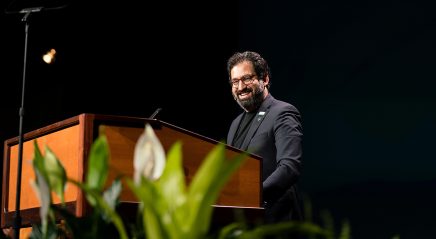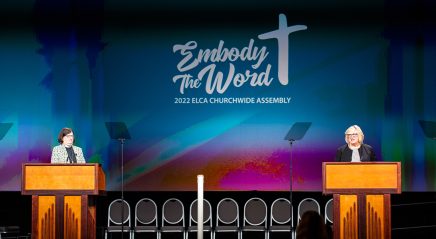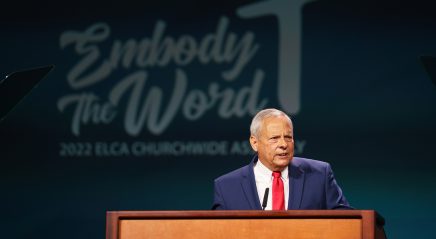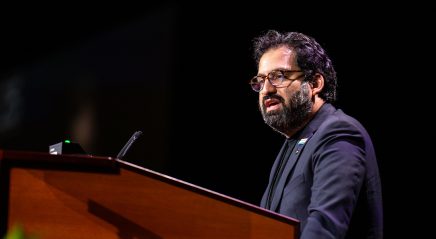Gathering under the theme “Embody the Word,” more than 800 voting members met Aug. 8-12 at the Greater Columbus (Ohio) Convention Center for the 16th ELCA Churchwide Assembly.
In her welcome, Presiding Bishop Elizabeth Eaton acknowledged that the assembly was gathering on the original and ancestral homelands of the Shawnee, Miami and Kaskaskia peoples. “We give thanks for their presence here since time immemorial,” she said.
The assembly also recognized the 35th anniversary of the adoption of the ELCA’s constitution in Columbus. “On April 30, 1987, the American Lutheran Church, the Lutheran Church in America, and the Association of Evangelical Lutheran Churches united to form the Evangelical Lutheran Church in America,” Eaton said. “This is a time for us to look back at the people and events that have helped shape our lives.”
During the week the assembly received a presentation on the “Declaration of the ELCA to American Indian and Alaska Native People” adopted by the ELCA Church Council in September 2021. The declaration was part of the implementation of the 2016 Churchwide Assembly’s resolution to repudiate explicitly and clearly the European-derived doctrine of discovery.
Repudiation of the Doctrine of Discovery task force members gave examples to the assembly of what the ELCA has been doing to live out the declaration, closed with remarks by Vance Blackfox, who began last year in his newly created position as ELCA director for Indigenous ministries and tribal relations. “It’s time to make a change,” he said.
Fawn Sharp, president of the National Congress of American Indians, then addressed the assembly “on behalf of 574 sovereign Tribal nations.”
A communion service on Aug. 10 centered Native voices as the assembly marked the repudiation (an article in Living Lutheran’s October issue will feature this service).
Among assembly actions, voting members passed a memorial to establish a Commission for a Renewed Lutheran Church. The commission will consider statements of purpose for the church and its organizational structure.
A nonlegislative session was also held in which Eaton issued an apology on behalf of the ELCA to Iglesia Luterana Santa María Peregrina, Stockton, Calif., following the abrupt removal of their pastor on the Feast of the Virgin of Guadalupe last year, along with a public commitment to be an anti-racist church.
The next assembly will be in Phoenix in 2025.
Innovation, authentic diversity
Addressing the assembly, Presiding Bishop Elizabeth Eaton reported on the ways in which the church has changed and adapted during the pandemic and shared that the ELCA has distributed more than $1.5 million to its synods through COVID-19 response grants.
“This was an entirely and very different time for all of us, and it required all kinds of ingenuity and skill and dedication and strength and perseverance and stamina,” Eaton said. “Worship, Bible study, checking in on members and neighbors, hunger ministries, serving communities, prayer groups, open-air worship—that all became more visible in our communities, and we never shut down.”
Eaton also emphasized the ways in which the ELCA has sought to become a more innovative and authentically diverse church. As part of her report, churchwide staff talked about their areas of work, including Kimberly Jackson, director of leadership development and co-convener of the Collaborative leadership development group, and Rebecca Payne, program manager for the Congregations Lead Initiative.
“When I think about innovation, I also think about transformation,” Eaton said. She then invited Nicolette Marie Peñaranda to share about her work as ELCA program director for African Descent Ministries, which is establishing and supporting a group of five new-start congregations across the U.S.
“As you can see, the church never closed,” Eaton said. “As I have said before, if God still has a use for an Evangelical Lutheran Church in America witness to the gospel, then we can’t be stopped.”
Signs of “hope and stability”
In her first report to a churchwide assembly as secretary, Sue Rothmeyer talked about how words matter when it comes to the church’s governing documents but how “the Word matters even more.” While giving a brief overview of the steps involved in amending the ELCA’s constitution, she encouraged the opportunity the assembly has every three years to ensure the ELCA’s constitution serves the church as a living—rather than fixed—document.
Rothmeyer also thanked congregations for their diligence in submitting annual reports despite the complexity of measuring such things as average weekly worship attendance during the pandemic. In reporting that the numbers of congregations, baptized members, baptized members who were confirmed, and active participants experienced some decline over the past three years, she framed the data by saying that the pandemic “undoubtedly influenced” such activity since some of the declines have slowed over the past year. “The data from 2021 show some signs for hope and stability,” she added.
She also reported that a dashboard-style version of congregation trend reports has launched, allowing for an easier-to-comprehend experience for people who seek information about a particular congregation.
In closing, Rothmeyer honored former Vice President Bill Horne, interim Vice President Carlos Peña, her predecessors who served as secretary, the Office of the Secretary staff and other ELCA leadership groups for sharing their sense of vocation with the church. “What a gift it is to serve with them … as together we care for the living words of this church and boldly embody and proclaim the living Word of God.”
Adding “marginalized” voices
In his report to the assembly, Carlos Peña, interim ELCA vice president, shared the actions brought forward to the assembly by the Church Council. One of the first recommendations was the call for the election of the vice president by ecclesiastical ballot.
Peña reported that another recommendation was a proposed bylaw amendment to allow for the inclusion of advisory members to the Church Council. The proposed amendment stated that the categories for the advisory members shall be set forth in continuing resolutions.
“The intent of the bylaw is for Church Council to hear from the voices frequently marginalized,” he said. “Council is aware that it needs greater diversity and cultural awareness that our elected leadership does not always embody.” Because continuing resolution amendments can be adopted by the Church Council, the proposed amendment “allows Church Council to be flexible and adjust categories as needed in the future,” he added.
The council also affirmed a redesign to strengthen the churchwide organization and align the ELCA “for the purpose of activating all ELCA members so more people know the way of Jesus and discover community, justice and love,” Peña said. “Let us envision a world experiencing the difference God’s grace and love in Christ make for all people and creation.”
In closing, Peña said, “I give thanks to God for you, members of the Evangelical Lutheran Church in America, for your faithful witness to the gospel and your deep love for this church.”
Thanks for your generosity
Lori Fedyk, ELCA treasurer, expressed gratitude on behalf of the ELCA for the “steadfastness and generosity” that congregations displayed in their giving over the past three years, especially considering the pandemic.
She reported that Mission Support, a source of unrestricted revenue that represents a portion of offerings that congregations share with synods and the churchwide organization, continues to be the ELCA’s largest revenue stream. Mission Support gifts in 2021 totaled more than $40.6 million.
Fedyk also reported that for 2019-2021, there was a net revenue of $11.1 million, which was generated, in part, by open positions and reduced travel, and not because of reductions in programmatic work: “It is important to note that as a nonprofit, our goal is to spend resources to further our mission.”
As part of the report, Daniel Kirschbaum, ELCA program director for young adult ministries, and Rahel Williams, ELCA mission funding director, shared stories about the ABIDE program and global missionaries as examples of work made possible through financial support to the church.
Fedyk also informed the assembly that from 2019-2021, ELCA World Hunger received $70 million and Lutheran Disaster Response received $34.5 million.
“‘Thank you’ does not seem like enough,” Fedyk said. “Your gifts make our work possible and allow us as a church body to impact millions of lives.”
In the same report, Louise Johnson, ELCA executive for administration, talked about the ELCA’s goal of engaging 1 million new, young and diverse people: “This work is not about people in the pews or dollars in the plate but about our deep calling to make disciples of all nations, to activate each of us so that more people know the way of Jesus and discover community, justice and love.”
2023-2025 budget approved
Voting members approved (751-19) the 2023-2025 ELCA churchwide organization budget. The budget comprises a current fund spending authorization of $68,814,000 for 2023 and current fund income proposals of $70,191,000 for 2024 and $71,594,000 for 2025. The budget also includes a spending authorization for ELCA World Hunger of $22,869,000 for 2023 and income proposals of $22,930,000 for 2024 and $22,960,000 for 2025.
Memorials address church governance, social issues and more
The assembly adopted (726-44) en bloc 19 memorials that covered topics including nuclear weapons, parental and family medical leave, communion practices and substance abuse. Memorials originate in congregations and are submitted by synod assemblies to the churchwide organization for the assembly’s consideration. They cover broad policy issues and programs that relate to the church’s mission and its public witness in society.
Twelve memorials were removed for separate consideration. Those considered and acted upon at press time include:
- Restructure the Governance of the ELCA: Calls on (738-72) the ELCA Church Council to establish a Commission for a Renewed Lutheran Church to consider statements of purpose for the church and its organizational structure and to present its findings and recommendations to the 2025 Churchwide Assembly in preparation for a possible reconstituting convention.
- Human Sexuality: Gift and Trust Revision: Authorizes (741-59) a reconsideration to revise the 2009 social statement “Human Sexuality: Gift and Trust” so its wording reflects current church understanding, church policy, civil law and acceptance of marriage of same-gender and gender-nonconforming couples. The action includes identifying the cost of revision and revenue source for such work, which could be considered as early as the 2025 Churchwide Assembly.
- Fortifying Urban Ministries: Calls for (762-31) the creation of an Urban Ministry group to accompany ELCA synods in their urban strategies to enhance congregational vitality and ministry sustainability in urban contexts and to share reports on ways for the church to fortify the witness and service among people in underserved urban areas.
- Black Migrant Strategy: Directs (783-16) the development of a proposal to strengthen advocacy, protection and accompaniment of Black migrants, particularly through AMMPARO (Accompanying Migrant Minors with Protection, Advocacy, Representation and Opportunities) and in partnership with U.S. and global ecumenical and interreligious partners.
- Mission Development Process: Calls for (758-38) greater equity and clarity on the mission development process, including studying and refining current ELCA guidelines related to appointments, calls, funds and support mechanisms for mission developers and new ministries.
- Land Back: Calls for (737-65) ELCA ministries and partners to engage in deeper collaboration with Indigenous partners, including incorporating land acknowledgments as part of public gatherings, exploring the creation of restorative justice programs, and studying funding needs and sources for ELCA Indigenous congregations and service ministries.
“This is the neighbor-loving work for which we’ve been set free,” said Bill Tesch, bishop of the Northwestern Minnesota Synod.
- Advance Salary Equity: Calls on (774-46) the Church Council to consider commissioning a study of pay gaps among ELCA rostered ministers and to share the findings throughout the church. The adopted memorial also encourages Portico Benefit Services and the churchwide organization to revise bylaws and privacy policies to facilitate deeper understanding of compensation patterns among rostered ministers and calls for an update to compensation-related questions in the Rostered Minister Profile.
- Separation Agreements: Affirms (721-79) a churchwide organization commitment to limit the use of nondisclosure provisions and to urge other expressions and partners of the ELCA to also limit the use of nondisclosure agreements, including as a matter of course or in termination of calls of rostered ministers.
- Roe v. Wade: Encourages (776-27) support and prayer for people affected by the overturning of Roe v. Wade, including rostered ministers and lay staff at congregations and social ministry organizations. It also calls for conversation on the church’s teaching on abortion and related topics, as well as synodical reviews of the impacts that overturning Roe v. Wade and other related local rulings may have on pastoral counseling and the pastor-client relationship.
“The conversations of how to embody the Word in a post-Roe v. Wade world are already happening … but without theological, legal and emotional support, we’re working off our best individual guesses, leaving room for tremendous error, exclusion and loss,” said Ashley Dellagiacoma, a pastor in the Texas-Louisiana Gulf Coast Synod. “We need our synod’s support and help.”
Memorials removed for separate consideration that were not acted on as of press time include Greenhouse Gas Reduction; Diversity, Equity, Inclusion, Accessibility (DEIA) ELCA Governance Audit; and Specialized Ministries and On Leave from Call Status.



